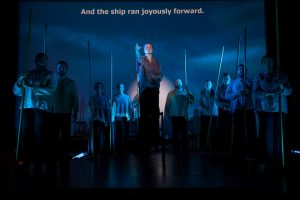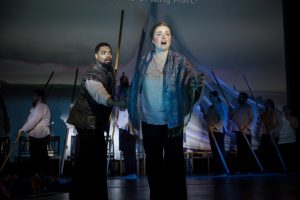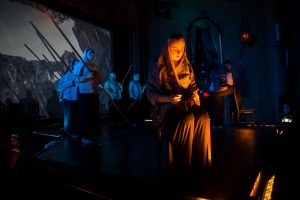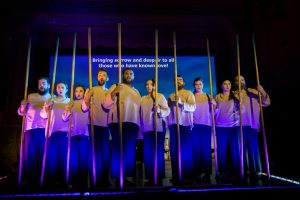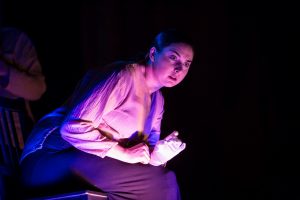LIEBESTOD WAS NEVER DARKER
For three performances only, a beloved Chicago movie palace becomes an opera house. Acoustically accurate but with sight lines that worsen toward the back, the Music Box Theatre, a Spanish Rococo treasure, is currently hosting Chicago Opera Theater’s local premiere of Swiss composer Frank Martin’s The Love Potion (Le Vin Herbé). Dissonant and dark, the three-act 1942 work depicts star-crossed medieval lovers Tristan and Isolde (better known through the 1865 version by Richard Wagner) and their lousy luck. It’s performed concert-style with supertitles and in vaguely medieval costumes, with a rhapsodic video backdrop by Andreas Mitisek and emotional lighting by David Lee Bradke. Director Mitisek’s ensemble-driven staging makes for powerful pictures as much as sound. Whether it touches the heart is far from certain.
Hewing to its source in Joseph Bedier’s “roman” and buttressed by a 12-person chorus armed with all-purpose staves, the legend recounts how the Irish princess Isolde (Lani Stait), reluctantly forced to marry King Mark (Nicholas Davis), accidentally takes the title elixir, meant by Isolde’s mother as a love potion to seal the deal. After her anguished maid Branghien (Brittany Loewen) confuses the philter with wine, Isolde fatally falls in love with her protector Tristan (Bernard Holcomb), nephew to Mark and accompanying her to Tintagel, his castle in Cornwall.
The unintentional lovers are (too) quickly discovered. Fleeing to a forest, after several years they’re captured and imprisoned under pain of death if they should reunite. (Strangely, as a peculiar punishment, Mark forces Isolde to live among lepers.) As an impossible distraction, Tristan marries Isolde with the White Hands (Kara Dills-DeSurra) but asks his friend Kaherdin (Jonathan Weyant) to bring Isolde back. Alas, Tristan’s wife, the other Isolde, foils this doomed attempt at a happy ending: Like Romeo and Juliet, the two are reunited only in death. The lesson for all lovers, the libretto points out, is that happiness, not endemic to earth, is meant instead for heaven.
Or something like that. Steeped in superstition, the story is as murky as the mystical and maundering music. (Maybe the real lesson is to label a love potion in advance so it’s not confused with a Pinot Noir.) Anyway, Mitisek’s powerful actor-singers acquit themselves well, despite an unrelievedly gloomy score that only waxes melodically medieval at the valedictory ending.
Unlike medieval partners Guinevere and Arthur, Héloïse and Abélard, or Pelléas and Mélisand, Tristan and Isolde are basically innocent victims of stupid fate; they never chose to love each other. (Indeed, earlier Tristan had injured Isolde with his indifference.) So any “Liebestod” visited upon them seems gratuitous and heavy-handed.
Seemingly all recitatives and no arias, Martin’s brooding composition seldom rewards these excellent singers with emotional breakthroughs. The temper throughout is doom and depression. The feelings of fatality and futility are only briefly lightened by evocative films of soaring trees pointing toward moving constellations or surging seas that betoken cursed fortune. As an achievement in collective music-making in an unusual venue, The Love Potion may quench some thirsts. But it goes down a bit bitter.
photos by Liz Lauren
The Love Potion (Le Vin Herbé)
Chicago Opera Theater
Music Box Theatre, 3733 N Southport
ends on October 9, 2016
for tickets, call 312.704.8414 or visit COT
![Post image for Chicago Opera Review: THE LOVE POTION [LE VIN HERBÉ] (Chicago Opera Theater at the Music Box)](https://stageandcinema.com/wp-content/uploads/2016/09/LOVE-POTION.jpg)




